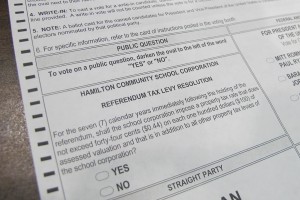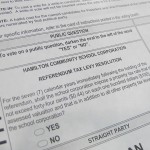Should School District Referenda Only Appear On The Ballot In General Elections?

Elle Moxley / StateImpact Indiana
Proposed legislation would only allow school districts to pursue referenda in general elections.
A proposal by Rep. David Frizzell, R-Indianapolis, would require school corporations ask voters to approve tax levy increases only in general elections, which occur in three out of every four years in Indiana.
Indiana is relatively new to school referenda — other states for years have asked voters to weigh in on tax increases to fund building projects and special programs. About half of the school referendums proposed since 2009 have passed, and school districts have pushed for levy increases almost as often in May as in November.
But in other states, school referenda are more common in non-general elections.
Purdue economist Larry Deboer told StateImpact last fall there are advantages for school districts trying to pass a tax levy increase in a primary or special election:
This is a pattern that is only beginning to emerge, but it’s certainly true elsewhere in the country: Putting it forward in May gives you a better chance of success than putting it forward in November. … In May, it may be the only thing on the ballot, so the school corporation can mobilize the parents and only people who are really interested in the referenda show up. In November, all those people who want to vote for president show up, maybe not even knowing the referenda is on the ballot. They’ll look at it and say, “Higher taxes?” and vote no.
Slightly less than two-thirds of referenda pursued in May have passed in Indiana. Slightly less than two-third of referenda pursued in the general election have failed.
Still, it’s often more expensive for districts to pursue referenda in non-general elections. From the fiscal impact statement filed with HB 1032:
Currently, a public question on a controlled project may be placed on the ballot of a general election, municipal election, or primary election. A special election may be held at the taxing unit’s expense. This bill would restrict public questions regarding capital projects or referendum operating levies to general elections.
Taxing units that would have otherwise requested a special election would save the cost of the election under this bill. In some cases, this bill would delay a vote on the question. Construction and borrowing costs could be affected by a delay.
If Frizzell’s bill passes, school boards that adopt a resolution to pursue a referendum after June 30, 2013, would have to wait to put it on the ballot. The next general election Nov. 4, 2014.

